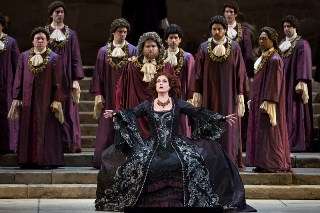|
Back
Fury of the Sea New York
Metropolitan Opera
03/06/2017 - & March 10, 13, 17, 21*, 25, 2017
Wolfgang Amadeus Mozart: Idomeneo, K. 366
Nadine Sierra (Ilia), Alice Coote (Idamante), Elza van den Heever (Elettra), Alan Opie (Arbace), Matthew Polenzani (Idomeneo), Noah Baetge (High Priest), Eric Owens (Voice of Neptune)
The Metropolitan Opera Orchestra and Chorus, James Levine (conductor)
Jean-Pierre Ponnelle (director, sets, and costumes), Gil Wechsler (lighting designer)

E. van den Heever (© Marty Sohl)
Mozart was just 25 when Idomeneo premiered under his own baton. But as so often happened in the life of that precocious composer, the work proved transformative. Fully two decades before Beethoven’s only opera Fidelio, running contemporaneously in the Met’s repertoire this season, Mozart’s pre-Da Ponte opera already showed in 1781 a deeper integration of choral and solo parts into the score and heightened orchestral coloration to accompany the recitatives. Four hours of opera seria may seem daunting, but the revival of the Met’s only production, which dates from 1982, unrolled pleasantly enough.
The sets are a bit frowzy after all this time. Jean-Pierre Ponnelle set the opera in grand ruins, not unlike the ones in his Met production of Mozart’s regal last opera La clemenza di Tito, and here they looked rather worn down. His costumes, which look roughly eighteenth-century rather than ancient, seemed fresher, but their impression was hit or miss. Among the bigger fashion victims was the jealous Elettra, whose angry diatribes unfold in near-grotesque, helped along by a massive black dress and unappealing red wig. In this era of bold new stagecraft at the Met, it may be time for a new production.
Mozart’s opera probes the ancient conflict of duty and sacrifice versus love and desire. Idomeneo, the King of Crete, has been saved from a shipwreck and promises Neptune to sacrifice the next person he meets in gratitude. Fate condemns him to meet his own son, Idamante, who has coincidentally fallen in love with the royal enemy captive Ilia despite the unstable Elettra’s infatuation with him. After much hesitation, Idomeneo and Idamante consent to the son’s sacrifice, only to have Neptune reward their virtue and devotion with a supernatural pardon. Idamante will live, take Ilia as his bride, and succeed his father as King. The moral message is there, but this production does rather little to highlight or comment on it.
A fine cast helped the evening along. Matthew Polenzani had big shoes to fill as Idomeneo. Earlier Met performers of the role included a cast-against-type Luciano Pavarotti, followed by Plácido Domingo and Ben Heppner. But this artist, who has grown and grown since he began appearing in comprimario parts two decades ago, was up to the challenge. The voice is steady if not exactly exciting, but it really came alive in the signature Act II aria “Fuor del mar,” in which Idomeneo compares the raging see to his own psychological complexities. In the trouser part of Idamante, mezzo-soprano Alice Coote reigned as one of the type’s better exponents. The fresh soprano Nadine Sierra sang Ilia with a light touch but seemed curiously unresponsive. The poorly costumed Elza van den Heever took on the role of the jealous Elettra with a truly superb dimension of control. Her small third act “mad scene” was a model of the talent the Met can field and drew handily the greatest applause of any of the evening’s arias. Alan Opie’s Arbace was steady and stentorian, suggesting that this talented singer should get more prominent roles. A bit of luxury casting came at the very end, with Eric Owen’s offstage singing of Neptune’s few lines of clemency. As so often happens these days, the Met’s versatile chorus sang in excellent form throughout the evening. The finale “Scenda amor” chorus, which celebrates the opera’s happy end, sent one out into the cold night with at least some hope.
Met music director emeritus James Levine chose this production for one of the handful that he has conducted this season. Despite all the talk of his health problems in recent years, they were not in any kind of evidence. He left every impression of having recovered full form and energy. The score moved briskly, with authoritative passion.
Paul du Quenoy
|